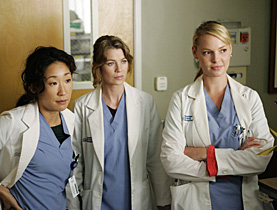
Female medical careers need booster

Women make up the majority of medical students but find it hard to reach the upper echelons of the profession, a review has found.
Proposals have been put forward to increase the number of part-time posts to enable female doctors – and male ones as well – to better combine work and family life.
Researchers writing in the latest bulletin of the Swiss Academy of Medical Sciences reported that women made up 57 per cent of medical students in Switzerland in 2007 compared with 30 per cent in 1980. However, they only made up 32 per cent of practising medics in 2007.
According to a study in which male and female medical students in Zurich were asked about their career wishes, which was cited in the article, attitudes start to change early on.
“At the beginning of their studies men and women had the same career wishes,” Anita Riecher, a professor of psychiatry at Basel University Hospital and the article’s first author, told swissinfo.
“But towards the end they had changed their mind. Women wanted jobs which they felt would be compatible with having a family, so they preferred disciplines with fewer night duties or which were less demanding, whereas males did not change in that way.”
For example, 47 per cent of paediatricians are female but only nine per cent of surgeons are women. For many women, the obstacles are structural.
“If you are on duty and you have to carry out an operation as a surgeon, you can’t just stop and say ‘I have to go and get my children from kindergarten’,” said Riecher, who is head of the outpatient psychiatric department at the University Hospital.
Stereotypical attitudes are still rife, with many women thinking that they alone had to be responsible for taking care of children, the article’s three authors found.
In addition, male medics tended to go for disciplines with more money and prestige.
Upper echelons
All these reasons combined to explain why women more rarely make it to the upper levels of the medical profession.
In 2008, 55 per cent of doctors at the University Hospitals in Basel were women, but only 38 per cent were consultants and 17 per cent medical directors.
In the Basel University Medicine Faculty they made up only ten per cent of professorships without chairs and six per cent of faculty chairs. This is the equivalent of two out of 35 – of which Riecher is one and the first women appointee.
A solution is to allow more part-time working and fixed work hours, according to Riecher and her colleagues in the article published late last year,
“We think especially in Switzerland that there should be more part-time jobs in research so that you don’t have to do your research during your clinical time,” explained the professor.
“This is very demanding because many young doctors have to do their research in the evenings and at the weekends if they want to have a career.”
Providing more crèches, as well as mentoring for young female doctors, would also help, the authors said in their “roadmap” of proposals to ease the situation.
“Feminisation?”
The article was partly produced in response to fears – that have also been expressed in other western countries, such as Britain and Germany where the situation is similar – that the “feminisation” of the medical profession could lead to it losing public acceptance and to pressure on salaries.
Riecher, a mother of two, says that she has managed to combine work and family because she was convinced that it was possible. But she says she wishes it were easier for young people.
She added that women doctors have been complaining about the situation for some time – a similar article was published around 25 years ago – and that not much had changed.
Making men more involved in childcare might be one effective way of finding a solution.
“We lose a lot of very bright young people, often those who are especially relationship oriented and would be very good in medicine,” Riecher said.
“They can’t bear that they have to make a decision over having a family so they decide to leave research and go into private practice. This is the case not only for women but also for young men.”
swissinfo, Isobel Leybold-Johnson
Switzerland
Female medical students: 1980 30%, 2006 57%
Percentage of practising women doctors: 1960 1%, 2007 32%
Germany
Female medical students (2006): 63%, practising doctors: 40%, top positions: 11-12%
Britain
Female medical graduates (2006): 58%, general practitioners: (2005) 40%, hospital consultants: 25%
Switzerland has been a pioneer in women’s medical studies. Marie Vögtlin (1845-1916) was the first Swiss woman to study medicine in Zurich in 1868, a few years after the very first female medical student in Paris.
Vögtlin wrote later: “I knew about the difficulties and prejudices that would bar my way, but I was prepared to meet them. For me, they all disappeared before my deep desire to study science.”
After finally obtaining permission to practise medicine after her studies, Vögtlin opened Switzerland’s first gynaecological hospital. She married geologist Albert Heim and had two children and a foster child.
The review of the situation facing women doctors in Switzerland was published in the fourth 2008 Swiss Academy of Medical Sciences bulletin.
It was authored by Anita Riecher, head of the outpatient psychiatric department of Basel University Hospital, Regine Landmann, professor and head of the Division of Infectious Diseases at Basel University Hospital, and Anne von Gunten, a doctoral student at the Bern Teacher Training College.

In compliance with the JTI standards
More: SWI swissinfo.ch certified by the Journalism Trust Initiative




























You can find an overview of ongoing debates with our journalists here . Please join us!
If you want to start a conversation about a topic raised in this article or want to report factual errors, email us at english@swissinfo.ch.